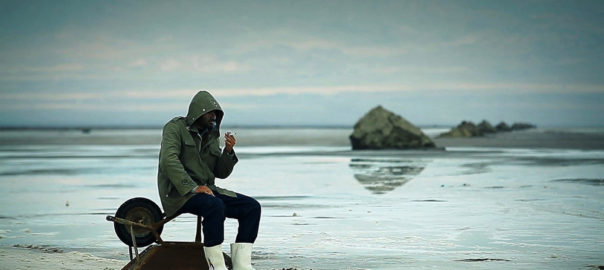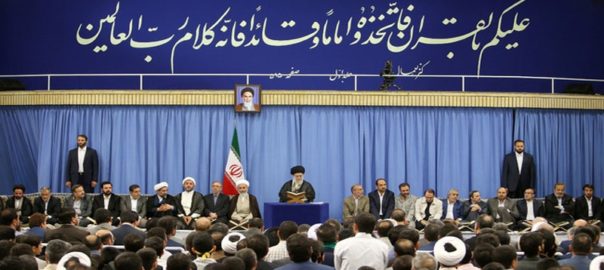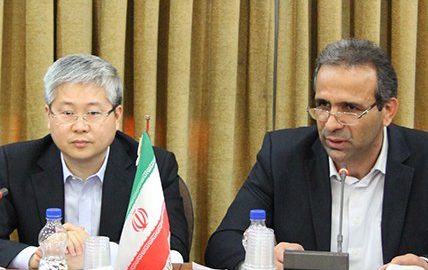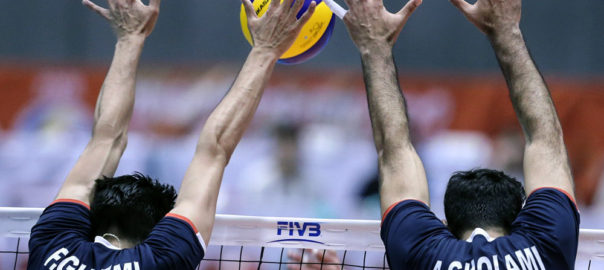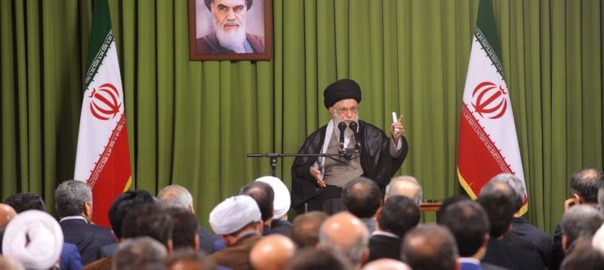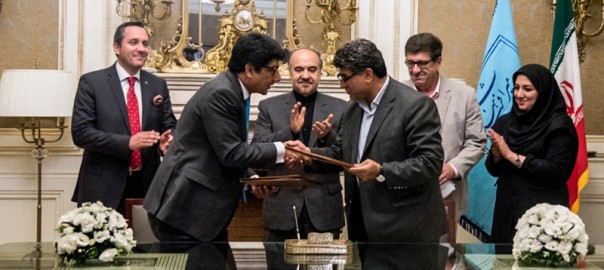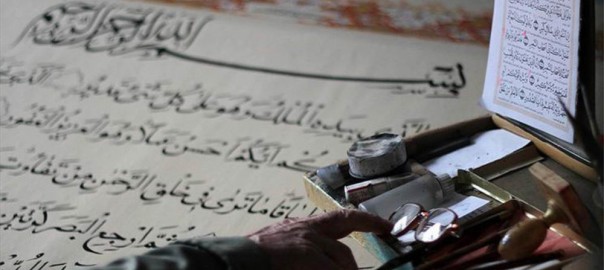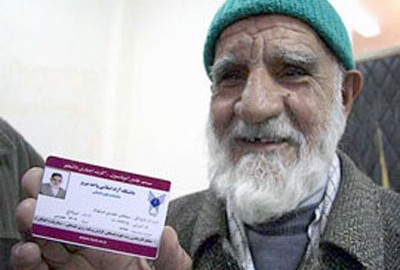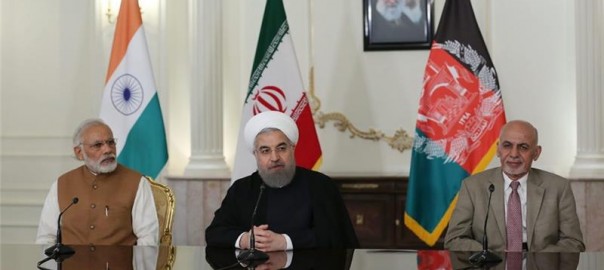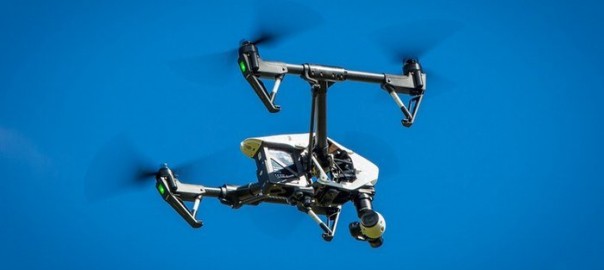Leader of the Islamic Revolution Ayatollah Seyyed Ali Khamenei, in a meeting on Sunday with the speaker and newly-elected members of the Islamic Consultative Assembly, which has just started its 10th mandate, stressed the necessity of the authority, prestige and standing of the parliament (Majlis) as the top legislative body and highlighted the requirements of appropriate legislation in Majlis. Enumerating the priorities of Majlis in dealing with the Economy of Resistance, culture as well as domestic, regional and international policies, Ayatollah Khamenei said: “The Islamic Consultative Assembly, while instilling the spirit of calm in the country, must be ‘revolutionary’ and act [in conformity with] revolutionary [requirements] in legislation [work] and react to hostile and biased positions of the US and resist arrogant policies.”
At the start of his speech, Ayatollah Khamenei congratulated the MPs in the 10th Majlis for having got the chance of service at the legislative body. Describing the status of the legislative body as elevated and exalted, the Leader of the Islamic Revolution said: “The legislative task assigned to Majlis is very important and actually lays the track for the administration to move.”
Stressing that the regulatory role of parliament is in no contrast with its cooperation with the administration, Ayatollah Khamenei said: “Such cooperation does not mean for Majlis to give up its rights and the MPs must follow up on the correct implementation of the law by exercising their legal authority like probe and auditing.”
The Leader of the Islamic Revolution said the MPs have taken the oath to safeguard the fundamentals of Islam and the achievements of Iran’s 1979 Islamic Revolution, adding: “Majlis must be genuinely at top of affairs and it is up to the MPs to preserve the real standing and prestige of Majlis.”
Laying emphasis on the point that the Islamic Consultative Assembly could guarantee preservation of its standing by supervising its own affairs, Ayatollah Khamenei highlighted the issue of good legislation and its requirements, saying: “Law must be of [high] quality, solid-based, all-inclusive, clear, in no contrast with other laws, anti-corruption, compliant with high-level decisions, born out of the expert views inside and outside the administration and take into consideration national interests rather than factional ones.”
The Leader of the Islamic Revolution referred to the draft of the 6th Five-Year Economic Development Plan as an important case in the agenda of Majlis, adding: “The [present] conditions in the country are special. Therefore, the 6th Plan must be carefully examined and adopted without any ignorance and laxness.”
Noting that a significant number of members of the 10th Majlis are first-time MPs, Ayatollah Khamenei said: “I see this issue as an opportunity because the presence of fresh MPs alongside some veteran ones will pave the way for an energized and motivated Majlis in which the former will benefit from the experiences of the latter.”
The Leader of the Islamic Revolution went on to highlight the priorities of the 10th Majlis and stressing that “economy” is one of major issues, Ayatollah Khamenei added: “The MPs are very influential with regard to the materialization of the Economy of Resistance because they can align the administration’s economic measures with the Economy of Resistance and also demand this issue from the government.”
Referring to the enemy’s efforts for using economy as a tool to harm the Islamic establishment, Ayatollah Khamenei said: “Certain acts of inexperience and some passive stances and remarks emboldened the enemy to take advantage of the weapon of sanctions. Still, the economic problems particularly stagnation and unemployment must be resolved and mere words are of no help.”
The Leader of the Islamic Revolution said resolution of the issue of stagnation and unemployment through boosting domestic production was one of the main and very important priorities in the economic sector and pointed out: “The [Islamic] establishment’s sense of shame vis-à-vis a jobless youth is greater than the jobless youth’s sense of shame in the face if his own family. Therefore, serious measures must be taken for resolving this problem.”
Ayatollah Khamenei said combating smuggling was another priority for Majlis in the issue of economy, adding: “Smuggling is like a stab in the back of the establishment and countering it is not easy. However, the administration must deal with this ominous phenomenon and Majlis must support [the administration in its] tackling of [smuggling].”
Ayatollah Khamenei also referred to the issue of culture as another priority of the 10th Majlis, saying: “The issue of economy is the urgent priority under the country’s current circumstances, but in the long run, culture is even more important than the economy.”
“In the issue of culture, a sort of irresponsibility and recklessness is seen in the cultural organs because there has been negligence with regard to development of helpful cultural products and avoiding development of harmful ones,” added the Leader of the Islamic Revolution.
Ayatollah Khamenei said: “In certain cases, insistence on urging people to refrain from using harmful non-cultural products like certain foodstuff is more than warning about harmful cultural products while the bad impacts of these products on people is more dangerous and widespread.”
“Sometimes, no action is taken nor any stance adopted against the development or entry of harmful cultural products because there is this fear of being accused of stopping the free flow of information,” said the Leader of the Islamic Revolution.
Referring to tough measures in Europe and in the US on controlling information, the Leader of the Islamic Revolution said: “We are afraid of their baseless accusations about preventing the free flow of information while our controls are less than one-tenth of their strict measures.”
Ayatollah Khamenei’s next piece of advice to the MPs was “to be revolutionary, to remain revolutionary and to act in a revolutionary manner”.
The Leader of the Islamic Revolution described the Islamic Consultative Assembly as a revolutionary body born out of Islamic Revolution and told the lawmakers: “In legislation and fulfilling obligations as an MP, act in a revolutionary way in your speeches and stances.”
Ayatollah Khamenei gave a significant assessment of Majlis’ general stances vis-à-vis major issues and praised the 9th Majlis for its good record in this regard. “Majlis must adopt a firm and transparent position in dealing with and countering political groups opposed to the Islamic Revolution.”
Pointing to the hostile behavior of the US administration and Congress vis-à-vis the Islamic Republic of Iran, the Leader of the Islamic Revolution added: “In the face of the enemies’ rudeness, we have to come to the scene and shut their mouth with firm response because in the political arena the enemy calculates based on reactions and if it feels that the opposite party is inactive and is willing to step back, then it will not stop asking for more and will make excessive demands.”
In this regard, Ayatollah Khamenei referred to the issue of nuclear talks, saying: “The Americans including the administration, Congress and hopefuls in the upcoming presidential election keep expressing excessive demands and making threats. Their positions now are the same as their stances before the [nuclear] agreement and we should not remain silent vis-à-vis such rudeness.”
The Leader of the Islamic Revolution went on to explain the enemy’s scheme for activating domestic faultlines, saying: “The enemy is making efforts to activate ethnic, ideological and factional faultlines into earthquake. Therefore, the MPs must make efforts to thwart this plotting of the enemy.”
“An MP can vote [on bills] based on his political view and ideology and is free to express himself or raise criticism in favor or against an issue, but that must by no means end in discrepancy, verbal scuffle, brawl and tensions as it happened at some points in the previous mandates of Majlis,” Ayatollah Khamenei said.
The Leader of the Islamic Revolution said tensions in Majlis will spill over into the society and give rise to tensions and negative psychological consequences there, adding: “In Majlis, calm must prevail and this calm will definitely be transferred into the society.”
Ayatollah Khamenei went on to elaborate on the enemy’s plotting across the region, saying: “The enemy has specific plans for the strategic and sensitive West Asia region and is making efforts to neutralize the Islamic Republic’s policies that are blocking materialization of its schemes.”
Touching on the outstanding features of West Asia region, the Leader of the Islamic Revolution said: “The presence of Islam and Muslims, huge oil reserves and waterways and the Zionist regime have made this region very important for the enemy and their scheme for this region is what they had formulated under the title of formation of “the New Middle East” and “the Greater Middle East” several years ago.”
Referring to the failure of US plots in the region including in Iraq, Syria, Lebanon and Palestine due to the steadfastness of the Islamic Republic, Ayatollah Khamenei said: “We have to stand against these hegemonic policies and unmask the Arrogance.”
Warning against adoption of positions and showing behavior favored by the enemy, the Leader of the Islamic Revolution noted: “In your speeches, express facts and realities of the Arrogance and the hegemonic system and make sure your words and deeds do not help the US and the Zionist regime.”
“The enemy has schemes for the Islamic establishment at three international, regional and national levels. At the international level, it continues its allegations [against Iran], at the regional level it [intends to] remove obstacles to the realization of its schemes, and at the national level it envisages activation of faultlines. Therefore, all [three] branches of government and officials, particularly MPs in the Islamic Consultative Assembly, must be careful vis-à-vis these plots,” said Ayatollah Khamenei to conclude his remarks.
The Leader of the Islamic Revolution also said the holy fasting month of Ramadan, the month of divine feast, is an opportunity for prayers, self-reinvigoration and good deeds, adding: “The chance of representativeness in Majlis granted to you dear [lawmakers] is a short-lived opportunity and position. You must appreciate it and ask for God’s assistance in fulfilling your legal duties.”
Prior to Ayatollah Khamenei’s remarks, parliament speaker Mr. Ali Larijani commemorated the late Imam Khomeini and highlighted the priorities and plans of the 10th Islamic Consultative Assembly.
“We are shouldering a heavy responsibility in defending the [Islamic] Revolution’s fortress and what can drive [ongoing] tense conditions in the region towards calm and sustainable security and guarantees Iran’s security is to hold a revolutionary vision and put it into practice,” said Larijani, adding: “Being revolutionary is the focal point of the Islamic Consultative Assembly and the 10th Majlis will give special attention to following up on monitoring regional developments.”
Noting that the US’s behavior following the implementation of the nuclear agreement shows the arrogant regime’s intention to harm Iran’s national interests, Larijani said: “The MPs feel obliged to use Majlis as a defense shield for [protecting] the rights of the nation against foreigners.”
Larijani stressed the need for cooperation and interaction among the three branches of government and also between the “nation and the administration” under the present circumstances, and noting that faster and more precise steps must be taken to leave stagnation behind, he said: “By focusing on the materialization of the Economy of Resistance and boosting production, all [parliamentary] committees will prioritize this issue and will follow up on bills and motions regarding the realization of the Economy of Resistance as well as supervising its implementation.”

